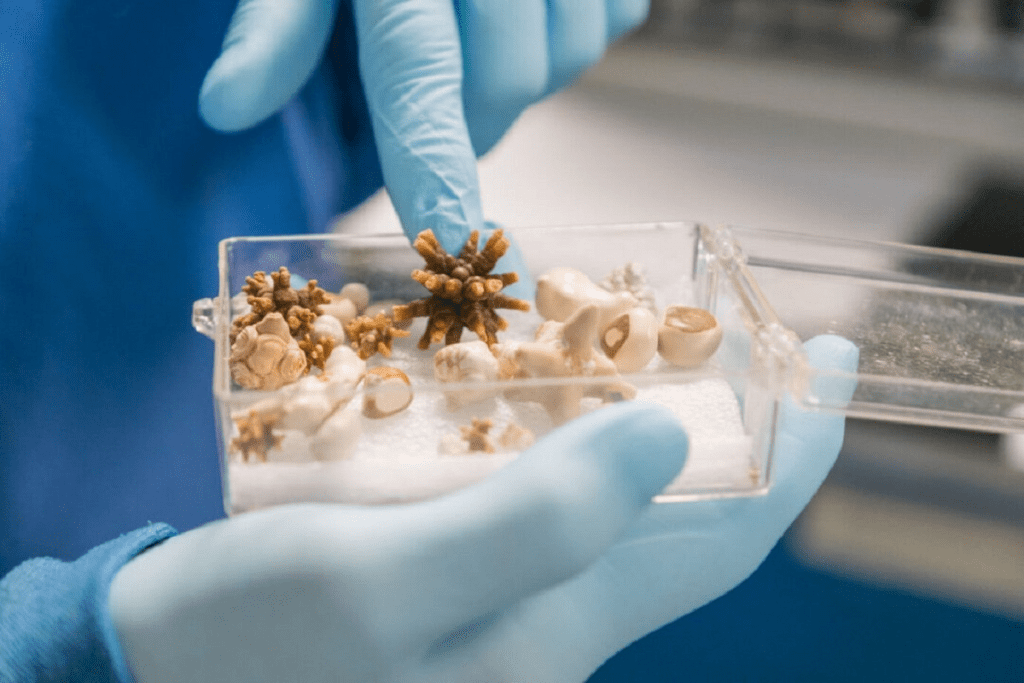Last Updated on November 25, 2025 by
Kidney stones can be very painful. At Liv Hospital, we aim to give top-notch healthcare and guidance on how to get rid of kidney stones. We also help international patients with support throughout their treatment.
Recent studies found that oral dissolution therapy (ODT) using potassium citrate works well. It can dissolve certain types of kidney stones, like uric acid stones, with great success.

Drinking lots of water is also important. It helps move kidney stones out and stops new ones from forming. Health experts say staying hydrated is key for kidney health.
Kidney stones come in different types, and knowing which one you have is key to finding the right treatment. We’ll look at the various types of kidney stones and how to treat them.
Uric acid stones respond well to treatment that makes urine less acidic. This is done with potassium citrate. The goal is to make the urine less acidic, helping dissolve the stones. Research shows that smaller stones and lower density stones dissolve faster.

Calcium stones are the most common and often need a mix of medicine and lifestyle changes. Thiazide diuretics help by reducing calcium in the urine. While dissolving calcium stones is harder than dissolving uric acid stones, diet and hydration play big roles in prevention.
Struvite stones are linked to infections, and cystine stones are rare due to a genetic issue. Treating struvite stones means fighting the infection. Cystine stones need special treatment to lower cystine levels. Sometimes, surgery is needed for these stones.
It’s important to know the type of kidney stone you have for effective treatment. By identifying the stone type and using the right treatment, patients can have better outcomes.
Dissolving kidney stones quickly is possible with the right treatment. We will explore the options. Medical treatments are key in managing kidney stones, providing ways to dissolve or pass them efficiently.
Drinking more water is the top advice for all stone types. Along with hydration, several medical treatments can help with kidney stones. Let’s look at these treatments in detail.
Oral dissolution therapy with potassium citrate is promising, mainly for uric acid stones. It involves giving potassium citrate to make urine more alkaline. This helps dissolve uric acid stones. Studies show a 64.8% success rate in dissolving these stones.
Potassium citrate works by making urine less acidic. This makes it harder for stones to form. It’s often suggested for those with frequent uric acid stones.
Alpha-blockers, like Flomax (tamsulosin), relax the ureter muscles. This makes passing kidney stones easier. They also reduce pain and speed up stone passage.
Flomax is a common choice for treating kidney stones. It helps pass stones faster and with less pain. Patients often find that it improves their experience.

Thiazide diuretics are used for preventing calcium stones. They reduce calcium in urine, lowering stone risk.
These diuretics prevent new calcium stones. They offer a long-term solution for those prone to calcium stones. This approach can greatly reduce future stone risks.
Alkali citrate therapy works for many stone types, including uric acid and calcium stones. It increases urine citrate, preventing stones.
This therapy is beneficial for various stones. It changes the urine environment to dissolve existing stones and prevent new ones.
In conclusion, these four treatments are effective for dissolving kidney stones quickly. Understanding these options helps patients choose the best treatment with their healthcare provider.
When kidney stones don’t pass on their own, surgery is needed. Dealing with kidney stones can be painful and frustrating. Sometimes, these stones need more than just medical treatment or home remedies.
In such cases, surgical options offer effective solutions for removing kidney stones.
ESWL is a non-invasive procedure that uses shock waves to break up kidney stones. These broken pieces can then be easily passed out of the body. This method works well for stones that are not too large and are in the kidney or upper ureter.
The procedure is typically done under sedation or anesthesia to minimize discomfort.
For stones further down the ureter or larger in size, ureteroscopy with laser lithotripsy is recommended. A small scope (ureteroscope) is passed through the bladder and into the ureter to find the stone. Once found, a laser breaks it into smaller fragments that can then be removed or passed out naturally.
In cases of large or complex kidney stones, percutaneous nephrolithotomy (PCNL) is the best option. This procedure involves a small incision in the back to insert a tube directly into the kidney. The stone is then broken up and removed through this tube. PCNL is used for larger stones that cannot be treated with ESWL or ureteroscopy.
It’s worth noting that while these surgical interventions are effective, research is ongoing into new technologies. Advanced vacuum aspiration devices could offer even more efficient solutions in the future.
Managing kidney stones can be helped by using home remedies every day. These natural methods can work alongside medical treatments. They might even help dissolve stones faster.
Drinking plenty of water is key to preventing and dissolving kidney stones. More fluid intake is recommended for all stone types. Aim for 8-10 glasses of water daily to keep your system clean and prevent stones.
A mix of lemon juice and olive oil is a well-known remedy for kidney stones. The citric acid in lemons can break down stones, while olive oil helps them pass. Mix 1/4 cup of olive oil with 1/4 cup of lemon juice and drink it first thing in the morning.
Apple cider vinegar can balance your body’s acidity, which may stop stones from forming. Its acetic acid can also dissolve stones. Mix 1 tablespoon of apple cider vinegar with 8 ounces of water and drink it twice a day.
Changing your diet can help manage kidney stones. Eating more fruits, vegetables, and whole grains can prevent stones. Cut down on sodium, avoid foods high in oxalate if you have calcium oxalate stones, and eat more foods with citrate, like lemons and oranges.
Adding these home remedies to your daily routine can help dissolve kidney stones faster. It can also prevent new stones from forming. Always talk to your doctor before changing your diet or treatment plan.
Several key factors affect how fast kidney stones can dissolve. Knowing these is vital for effective treatment. The success of treatment depends on the stone’s characteristics and the chosen therapy.
The size and density of kidney stones play a big role in treatment success. Smaller stones dissolve faster because they have a bigger surface area. This makes it easier for dissolution agents to work.
The stone’s location in the urinary tract affects treatment success. Some areas are easier to treat than others.
For example, stones in the lower pole of the kidney are harder to treat. Knowing where the stone is helps choose the best treatment.
New medical technologies, like vacuum aspiration devices, offer hope for kidney stone management. These devices might make stone removal more efficient and reduce recovery times.
Understanding what affects kidney stone dissolution helps doctors create better treatment plans. This leads to better results for those with kidney stones.
At Liv Hospital, we know that every kidney stone case is different. We look at the type of stone, your medical history, and your lifestyle. This helps us make a treatment plan just for you.
To pass a kidney stone quickly, we consider many options. These include medical treatments and surgery. It’s important to find the right one for you.
We talked about ways to dissolve kidney stones. This includes oral therapy, alpha-blockers, and thiazide diuretics. If you’re looking for medication, talk to a doctor. They can help you choose the best treatment.
Knowing how to stop kidney stone pain right away is key. It makes life better for those dealing with stones.
We combine medical knowledge with a personal touch to manage kidney stones. Our aim is to offer top-notch healthcare. We support international patients with detailed guidance. Together, we create a plan that meets your needs and improves your health.
Oral dissolution therapy with potassium citrate is highly effective for certain types of stones, like uric acid stones. Other methods include alpha-blockers like Flomax, thiazide diuretics, and alkali citrate therapy.
Drinking plenty of water is key to passing a kidney stone quickly. Alpha-blockers like Flomax can also help. Sometimes, surgery like ESWL or ureteroscopy is needed.
The best medication varies by stone type. Potassium citrate works well for uric acid stones. Thiazide diuretics are good for calcium stones. Alpha-blockers like Flomax help pass stones.
For immediate pain relief, see a doctor. They may prescribe pain meds. Sometimes, surgery is needed to remove the stone.
Drinking lots of water, lemon juice, and olive oil can help dissolve stones. Apple cider vinegar can balance acidity. Eating less sodium and animal protein also helps.
If a stone is stuck, get medical help. Ureteroscopy or ESWL may be needed. Alpha-blockers like Flomax can also help.
Stone size and density are key. Smaller stones dissolve faster. The stone’s location also matters. New technologies like vacuum aspiration devices are being explored.
Subscribe to our e-newsletter to stay informed about the latest innovations in the world of health and exclusive offers!